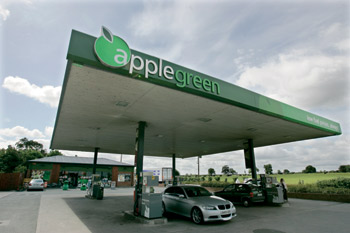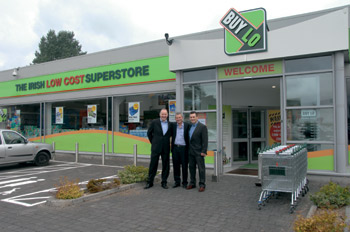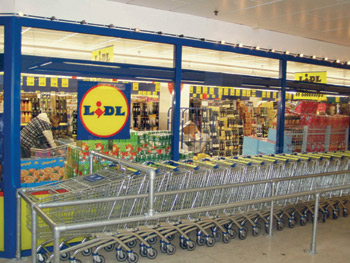What’s in a name?

What insights, we wondered, were hiding in the names of Ireland’s retail chains? Colette O’Connor decided to find out.
18 January 2011
Aldi
The first Aldi store opened in Germany in 1948. Aldi is short for “Albrecht Discount”. In its homeland of Germany the chain is made up of two separate groups, ALDI Nord (North – operating as ALDI MARKT) and ALDI Süd (South – operating as Aldi Süd), which operate independently from each other within specific market boundaries. The individual groups were originally owned and managed by brothers Karl Albrecht and Theo Albrecht; Karl has since retired and is Germany’s richest man. Theo was Germany’s second richest man until his death in July 2010.
Official slogan: Spend a little, live a lot.
Applegreen
Applegreen was launched in Urlingford in 2004.
Directors, Bob Etchingham and Joe Barret wanted the brand name to reflect the concept’s brand essence: simple solutions everyday in conjunction with fresh and new; full of healthy and tasty food; commitment to reducing the company’s impact on the environment; and somewhere you visit daily that’s good for you ‘an apple a day keeps the doctor away!’ The name was not derived from market research or external consultants. Bob liked the ‘Apple a day keeps the doctor away’ analogy, and asked his daughter what she thought. Family discussions led to the name ‘Applegreen’.
Official slogan: “Applegreen, Low fuel prices always” and “Applegreen, now that’s better”.
 Buy Lo
Buy Lo
The Barry Group launched the Buy Lo chain in July 2009. Buy Lo offers a unique concept in discount retailing offering well-known brands and food and non-food items at discounted prices.
The name Buy Lo was devised to highlight the value message in the discount sector.
Official slogan: The Irish Low Cost Superstore
Carry Out
Carry Out was launched in 2003 and taken over by The Barry Group in 2009. As a leading specialist off-licence franchise operator, the name Carry Out is self-explanatory – Carry Out is all about local businesses serving local communities with excellent levels of expertise and product range.
Official slogan: Simply Better Wines, Beers and Spirits
Centra
Musgrave launched centra in 1979. Both Centra and SuperValu came about through the rebranding of the existing VG chain, with the smaller stores taking on the Centra franchise and the larger ones the SuperValu name.
As parts of vertebrae, Centra are the plural of centrum.
Official slogan: Centra, for the way we live today
Costcutter
The Barry Group acquired the Costcutter franchise for the Republic of Ireland in 2000. The Costcutter franchise was originally launched in the UK in 1986 where it remains a strong player in the c-store sector. The name Costcutter was given as ‘a value driven’ name – cutting costs for consumers. Costcutter operates three formats; supermarket, foodmarket and express.
Official slogan: Always more to offer
Dunnes Stores
Bernard “Ben” Dunne, Sr., opened his first store in Cork in 1944. The success of the first store prompted Dunne to add new stores elsewhere in Cork and then throughout Ireland. Initially, Dunne’s shops, already called Dunnes Stores, featured only clothing and other textile items. Dunne soon recognised the potential for adding groceries— It started with boxes of apples and oranges, as fruit was very expensive at that time. In 1956 the St. Bernard own-brand name was launched, some believe that the name was chosen to appeal to Dunnes’ overwhelmingly Catholic consumer base, while others think the name was chosen as a nod to Marks & Spencer’s St. Michael brand.
Official slogan: Dunnes Stores – The difference is we’re Irish.
Gala
Gala was launched in 1998 and now has over 300 stores in the Gala Group.
The Gala name was initially chosen because of its celebratory, group and collective connotations. The Gala corporate identity was redesigned in 2007.
Official slogan: Gala – Your local market and Great value at Gala
 Lidl
Lidl
In 1930, Josef Schwarz became a partner in Südfrüchte Grosshandel Lidl & Co., a fruit wholesaler, and he subsequently developed the company into a general food wholesaler. In 1977, under his son Dieter Schwarz, Lidl & Schwarz began to focus on discount markets. The first Lidl discount store was opened in 1973. Dieter Schwarz’s problem was that he could not just start using the Lidl name. As Schwarz Markt (Black Market) did not seem like a good name for the stores, he bought the right to use the Lidl name from Ludwig Lidl for 1,000 marks.
Official slogan: Seriously cheaper!
Londis
Historically the name Londis was a contraction of “London District Stores” using the first three letters from each of the words London and from district to form Londis.
The Irish brand Londis’ full corporate name is ADM Londis. Its origin is divided into two, the ADM name and how the Londis name came about.
The ADM wholesale business was founded in 1954. The acronym ADM at this point stood for Allied Dublin Merchants. In 1975, ADM Londis Ltd opened a distribution warehouse in Johnstown, Naas, Co Kildare. To reflect this expansion of business outside Dublin ADM became Allied Distributive Merchants, Its subsidiary, ADM Londis Ltd, began in 1970 when it acquired the Londis master franchise for Ireland.
In 1995, ADM bought the rights to the Londis brand for the island of Ireland outright and celebrated its 25 year anniversary in Ireland.
Official slogan: Close to you
Mace
Mace was founded in 1960 and is the longest established convenience brand in the Irish market. The Mace business was originally operated by three wholesale groups; Punch, Mangans and BWG. Since 2008 the brand has been operated by BWG Foods in the Republic of Ireland. Under BWG’s ownership, the brand has developed a strong reputation for its dual format strategy through forecourt and neighbourhood local community retailing. In 2010 Mace is celebrating 50 years of service to local communities.
Official slogan: Mace, We Make It Easy
 Marks & Spencer
Marks & Spencer
The name comes from the surnames of the original founders, a Polish man called Michael Marks and Thomas Spencer, a cashier from Yorkshire. On his arrival in England, Marks worked for a company in Leeds which employed refugees. In 1884 he opened his first market stall and went on to open many more in various locations. In 1894, Thomas Spencer invested in Marks’ activities and they opened their first store, in partnership in Manchester.
Official slogan: Your M&S
Quik Pick
The Barry Group launched Quik Pick in 1996. The name, which was devised by management at the Barry Group, was chosen to highlight the convenience and speedy service offered by the Quik Pick stores. This name was launched well before the National Lottery launched their Quik Pick game!
Spar
Spar was launched in Ireland in 1963. The brand is owned and operated by BWG Foods. With over 460 stores in the ROI, Spar prides itself on being local, partnering with leading independent retailers in every county, as well as being part of a global brand operating in 34 countries around the world.
Founded in Holland in 1932 by Adriaan Van Well, Spar is the world’s largest grocery chain. Although there is much speculation as to the meaning of the word Spar with some mistakenly thinking it is derived from the Dutch word for ‘to save’ Besparen, Spar is in fact an acronym of a Dutch sentence that explains where modern day ‘Spar’ finds its foundations. Back in 1932 Van Well called his new retail concept ‘De Spar’, which is derived from the following Dutch phrase: ‘Door Eendrachtig Samenwerken Profiteren Allen Regelmatig’ which when directly translated means, ‘We all benefit from joint cooperation’.
Official slogan: Under the Tree at Spar
SuperValu
Musgrave launched SuperValu in 1979. Both SuperValu and Centra came about through the rebranding of the existing VG chain, with the smaller stores taking on the Centra franchise and the larger ones the SuperValu name.
Official slogan: Real Food, Real People
Tesco
In 1919 Tesco founder Jack Cohen was selling surplus groceries from a stall in the East End of London. The first own-brand product sold by Cohen was tea. The name Tesco comes in part from the name of that tea supplier TE Stockwell. By taking the TE S from the name of his tea supplier and the CO from his own surname, the name Tesco was born.
Official slogan: Every little helps
XL
The XL Stop & Shop brand was first launched in 1997, following a strategic review in early 2009; the name was shortened to XL. Consumer and retailer research found a strong connection between XL stores and the communities they serve, hence the genesis of the shortened brand. The XL name takes into account retailer preferences for co-branding (i.e., Murphy’s XL), which is very important to independent retailers. The other major reason for the name change was to put a greater emphasis on communication with shoppers in terms of value and special offers with ‘XL’ – translating as extra or more.
Official slogan: A great deal more at your local store
Get the name right!
Getting the right name for your store needs long and careful consideration. What are the elements of a good store name? According to Brian McGurk, partner in leading brand building specialist company Bradley McGurk: “A name should be short and pithy. Names that are simple, easy to remember and easy to pronounce work best. If what you are selling has a product or geographic provenance it could be very important to incorporate this into the store name, as it’s something you can trade off.
“Ideally, your store name should convey the expertise, value and uniqueness (provenance or heritage) of what you are selling. Abstract names that consumers maybe do not understand can invite the customer to use their imagination and attribute certain values to your store. However, a name like “Murphy’s Vegetable Store” tells the customer exactly what’s on offer. Both name strategies work but for different reasons. The question you have to ask is, is the name relevant to your shopper or appealing to your shopper?” McGurk explains, “The name Penneys is a pretty mundane one, but their stores are always full and they certainly appeal to their target audience.
In relation to product provenance, McGurk says that this was key to the formation of The Butcher’s Block name developed by Bradley McGurk for the Cribbin chain of butcher shops. “At a very basic level the consumer knows that this shop sells meat but the combination of words suggests things like freshness and quality. This name also suggests craft rather than mass produced,” says McGurk.
Super business
It is no coincidence that SuperValu, Superquinn or Supermacs use the word super. “Through the power of suggestion they are stating that if you come in here you will have a “super” experience. With a name like this you are making a promise to the customer but if you don’t deliver you are then living on borrowed time,” says Brian McGurk. He continues, “The key to success is to under-promise and over-deliver – this is true for a store, a brand, a name or a business and it will keep people coming back again and again”.
People prefer words they can relate to and understand. It is generally accepted that strings of numbers do not work. 7-11 worked well until twenty-four hour trading came along. The 911 (nine one one) stores are also referred to as 9-11 (nine eleven), which obviously does not conjure up the right image for a forecourt store. The Exxon name was contrived by Esso in the early 70s, however within days it was being called the “double cross company” so this eventually subsided!
Keep it snappy
Store names that tick Brian McGurk’s boxes are ‘Next’ – it’s short and snappy and implies modern and forward looking – perfect for a fashion chain. “Supermacs, is an amazing success story and is successfully outtrading its nearest competitor and one of the largest corporations in the world. Elvery’s Sports has huge geographic provenance and generates huge loyalty in Irish people and of course The Butcher’s Block!”
Neither Aldi nor Lidl do much for McGurk but if he had to choose which name is the poorer of the two he would opt for Aldi. He also thinks that names with “euro” in them have had their day – “I think that nowadays they conjure up the image of cheap rather than value. Today’s consumers are in a post celtic tiger mindset – they absolutely expect value at every turn and take it for granted. That’s a given so the retailer has to really look at what else they can offer and suggest through their choice of store name.”
The advice from the experts is that before you start thinking up names for your new business; try to define the qualities that you want your business to be identified with.
Brian McGurk says “think of a name that inspires people in some way. A name that inspires, surely demonstrates that the brand owner knows the customer better and will work harder to deliver what the customer wants”.



 Print
Print





Fans 0
Followers